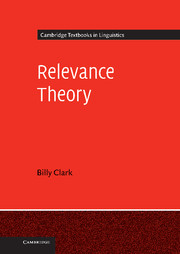Book contents
- Frontmatter
- Contents
- List of Figures and tables
- Preface
- Acknowledgements
- Typographical conventions
- Part I Overview
- 1 A first outline
- 2 Origins and alternatives: Grice, relevance theory and modern pragmatics
- 3 Principles of Relevance
- 4 Explaining inferences
- Part II Details and developments
- Appendix Key notions of relevance theory
- Notes to chapters
- Bibliography and other resources
- Index
2 - Origins and alternatives: Grice, relevance theory and modern pragmatics
from Part I - Overview
Published online by Cambridge University Press: 05 June 2013
- Frontmatter
- Contents
- List of Figures and tables
- Preface
- Acknowledgements
- Typographical conventions
- Part I Overview
- 1 A first outline
- 2 Origins and alternatives: Grice, relevance theory and modern pragmatics
- 3 Principles of Relevance
- 4 Explaining inferences
- Part II Details and developments
- Appendix Key notions of relevance theory
- Notes to chapters
- Bibliography and other resources
- Index
Summary
Topics: Grice and meaning; Grice's ‘theory of conversation’; critiques of Grice; the development of relevance theory; other approaches
Overview
Now that we've had a first look at relevance theory as a whole, this chapter fleshes out the picture by considering how it developed from the ground-breaking work of Paul Grice. Grice made arguably the most significant breakthrough so far in our understanding of how we infer contextual meanings and laid the foundations for most if not all recent work in pragmatics. His work inspired a number of others to develop their own approaches. Most significantly for this book, it was in exploring and critiquing Grice's work that Sperber and Wilson came up with the insights that led to the development of relevance theory. The chapter begins with an outline of Grice's work on natural and non-natural meaning before discussing Grice's ‘Theory of Conversation’ (the scare quotes reflect the fact that, as we will see, what Grice proposed was misnamed in at least two ways: first, it was not a fully-fledged theory; second, it was not only about conversation). In general, responses to Grice's ideas were very positive. At the same time a number of problems were identified. Particular issues include the vagueness (acknowledged by Grice when he first presented his ideas) about what exactly ‘relevant’ might mean and the sense that some of the ideas he suggested might be redundant (more than one of the components of his theory seem to be designed to do the same job). We consider how exploring these issues led Sperber and Wilson to define ‘relevance’ in a radically different way and to propose replacing Grice's account with something new. It is worth noting right away that some subsequent discussion has made the mistake of seeing relevance theory as an essentially Gricean approach in which the number of maxims has been reduced to one. This is incorrect. Relevance theory is broadly Gricean in assuming that general pragmatic principles guide interpretations and that the principles involved are broadly rational.
Information
- Type
- Chapter
- Information
- Relevance Theory , pp. 43 - 89Publisher: Cambridge University PressPrint publication year: 2013
